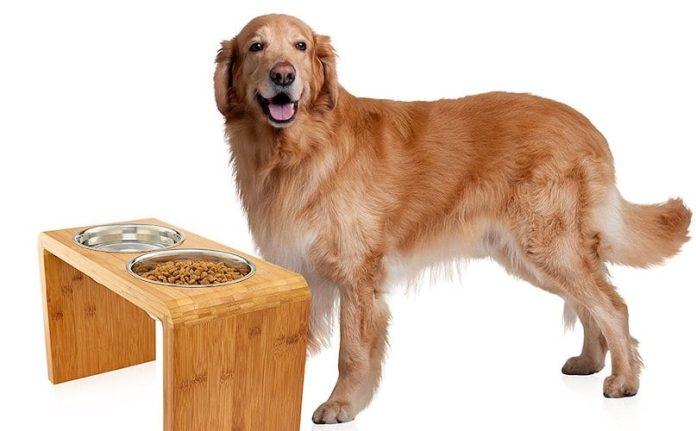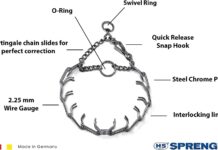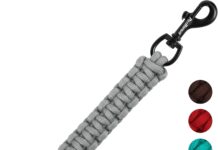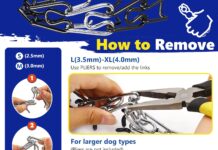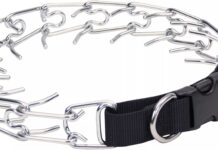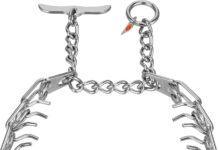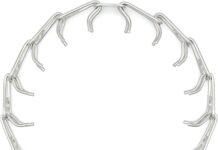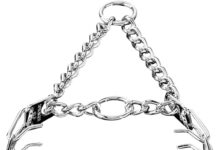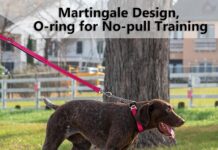Have you ever wondered if there is a benefit to using an elevated dog bowl or if it’s just a fashion statement? If so, you’re not alone.
There’s been much debate about whether elevated bowls are better for your pup, and we’re about to get to the bottom of it.
In this blog post, we’ll explore the pros and cons of using raised dog bowls and offer advice on providing the best option for your pet.
The Pros of Elevated Dog Bowls
There are a few pros to using elevated dog bowls, such as:
- They can help reduce back and neck strain for your dog. If your dog constantly has to bend down to eat from a bowl on the ground, it can strain its back and neck. An elevated bowl can help keep them in a more natural eating position.
- They can also help with digestion issues. Some dogs may have trouble properly digesting their food if they bend to eat it. Eating from an elevated bowl can help them maintain a better posture while eating, which can aid in digestion.
- Bloat is a serious medical condition affecting dogs eating from ground-level bowls. When a dog eats from a high bowl, gravity helps keep food in its stomach where it belongs instead of letting it rise and cause bloat. Elevated bowls can also help reduce bloat.
The Cons of Elevated Dog Bowls
There are a few potential downsides to using elevated dog bowls. First, they may be less stable than bowls on the ground, making them more likely to tip over and spill.
Second, elevated bowls can be more challenging to clean than traditional bowls – food and water can get trapped in nooks and crannies, making it tough to reach all the areas that need to be scrubbed.
Finally, some dogs may prefer to eat or drink from a bowl at ground level, and forcing them to use an elevated bowl could make mealtime stressful.
The Perfect Height for an Elevated Dog Bowl
Many experts recommend elevated dog bowls for various reasons, including better digestion and easier accessibility for senior dogs.
But what is the perfect height for an elevated dog bowl?
The answer may vary depending on the size and breed of your dog. A good rule of thumb is to ensure the bowl is at least 4 inches (10 cm) off the ground but no more than 12 inches (30 cm). This will allow your dog to eat without strain or discomfort comfortably.
If you have a small or medium-sized dog, you can get away with a shorter bowl stand.
However, you may need to raise the bowl for large dogs, so they don’t have to stoop down as far. You can also find adjustable elevated dog bowls that can be raised or lowered.
Whatever height you choose, ensure it’s comfortable for your dog and allows them to eat and drink quickly.
How to Choose the Right Material for an Elevated Dog Bowl
There are many factors to consider when choosing the suitable material for an elevated dog bowl, including your dog’s size, eating habits, and overall health.
- Size: The size of your dog will dictate the size of the bowl you need. If you have a small dog, you will need a small bowl. If you have a large dog, you will need a giant bowl.
- Eating habits: If your dog is a fast eater, you will want to choose a shallow bowl so they cannot gorge themselves. If your dog is a slow eater, you will want to select a more bottomless bowl so they can reach their food.
- Overall health: If your dog has joint pain or arthritis, an elevated bowl can help them eat without stopping low.
If your dog has trouble digesting food, an elevated bowl can help them eat slowly and avoid bloat.
How to pick the suitable bowl
There are many factors to consider when choosing a suitable bowl for your dog, such as size, material, and height.
The first thing to consider is the size of your dog. You’ll want to ensure the bowl is big enough for them to eat from comfortably but not so big that they can’t reach the food.
Next, you’ll want to decide on the material. Stainless steel bowls are popular because they’re easy to clean and don’t harbor bacteria.
But if your dog is a heavy chewer, you might opt for a ceramic bowl that’s more durable.
Finally, you’ll need to decide on the height of the bowl. Some people prefer elevated bowls because they believe it’s better for your dog’s digestion.
Others find that their dogs prefer bowls at ground level. Ultimately, it’s up to you and your dog to decide what works best for them.
Different types of elevated bowls
There are a few different types of elevated bowls on the market. Some are very simple and have a raised platform for the bowl.
Others have a more complicated design with multiple levels or compartments.
The height is the most important thing to consider when choosing an elevated bowl. You want to ensure the bowl is high enough off the ground that your dog can comfortably eat from it without bending down too far. But you also don’t want it to be so high that your dog has to strain his neck to reach the food.
Many cute and stylish elevated bowls are available if you have a small dog. But if you have a large breed, you may need to look for something more heavy-duty.
There are also some great options for outdoor use, like raised bowls that sit on top of an existing picnic table or deck railing.
Case studies
A dog bowl should be elevated if your pet is small, has short legs, or is elderly, and you think it might make it easier for them to eat.
Some people also believe that an elevated bowl can help digestion by allowing gravity to do its job.
If you have a bigger or larger pet with long legs, then an elevated bowl might not be necessary. It depends on your pet’s individual needs.
If you’re unsure whether an elevated bowl suits your dog, ask your veterinarian for their opinion.
Conclusion
Choosing a suitable dog bowl is essential for your pup’s health and comfort.
Elevated bowls can help keep them at a more comfortable height while aiding digestion and preventing neck strain.
Plus, they look great in any home. Ultimately, it comes down to personal preference – you know what works best for your pet!
Consider these factors when deciding if an elevated dog bowl is suitable for you.

